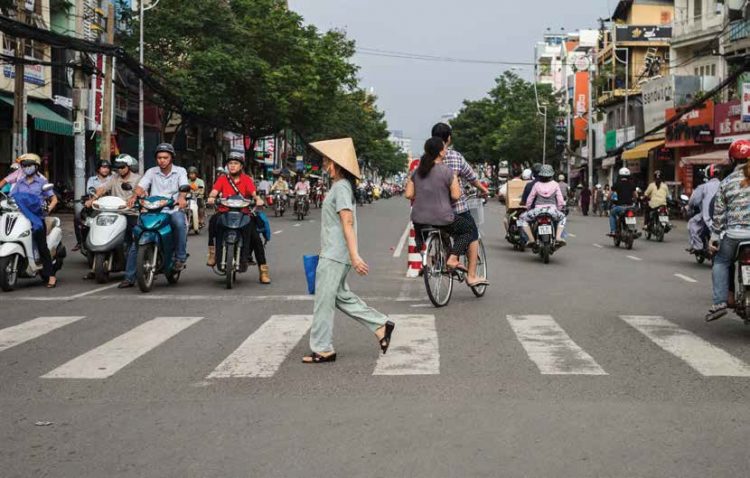A small casino in the north flourishes and a massive one in the south flounders in a market where the potential is vast but a winning investment model remains elusive
Provincial governments across Vietnam are clamoring for casinos at a time when the largest and most elaborate gaming resort in the country, The Grand – Ho Tram near the Mekong Delta on the South China Sea coast, is struggling to generate even a modest return on its US$500 million investment. The National Assembly’s response has been to consider the unprecedented step of formally regulating the industry. The idea is to make the country more comprehensible for big investments like Ho Tram. Yet the rules they are considering, at least as they appear so far, would render it an even tougher place to make money.
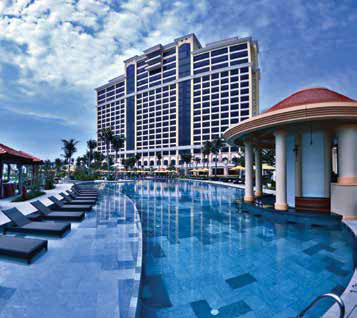
An ironist’s dream? Not as long as investors worlwide continue to look for new and creative ways to play the Asian tourism boom. China sent more than 80 million travelers into the world last year, and that makes Vietnam an attractive place to think about as a destination, the absence of a destination-scale casino industry notwithtanding. International arrivals to the country rose more than 10% last year to almost 7 million, 1.7 million of them Chinese. It’s why some 10 provinces have applied to the central government this year alone for permission to pursue gaming investments.
“They are in a race to earn money from this,” said Minister of Planning and Investment Bui Quang Vinh.
Joey and Ben Lim would beg to differ as well. The nephews of Genting Group’s billionaire Chairman Lim Kok Thay recently won an amended investment certificate from Hanoi endorsing a $50 millionplus expansion of their foreigners-only casino in the far north of the country accross the border from China’s Yunnan province. Their new Lao Cai International Hotel is scheduled to open the 18th of May with 428 hotel rooms, up from 34, and a casino that will go from eight very profitable table games to as many as 50 very profitable table games.
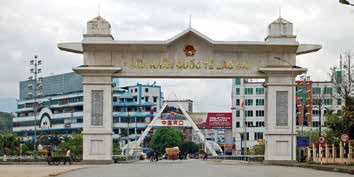
There are 45 million people in Yunnan. They’re the ballast under the ASX-listed stock of the Lims’ investment vehicle, Donaco International (ASE: DNA), which is valued currently at about $521 million on a share price that has risen more than 200% over the last year. Those Yunnanese are the reason the Lao Cai International was able to book US$40 million in gaming revenue in 2013, 80% of it VIP play delivered via relationships with some 20 junket operators. That’s roughly $11,000 per table per day, and what it implies for 2014- 15 in terms of the bigger casino that opens this month is a capacity to generate well more than $100 million a year—not counting the hotel side—and that’s equivalent to about one-third of the entire Vietnamese market as it exists today.
On the strength of it Donaco was able to raise A$100 million from two private placements in Sydney in the last year to pursue what it terms a “strong pipeline of opportunities” in which Vietnam is likely to figure as prominently in the future as it does today.
It’s been a nice revenue stream as well for the provincial government, which owns 5% of Lao Cai.
And two new highways are coming to the region that will only bolster the resort’s positioning: one from Hanoi designed to tie the province more closely to the larger economy of the north, one from China that will cut the drive from Yunnan’s capital of Kunming in half to about four hours.
About 160 kilometers east of Hanoi, the casino in the northern port city of Haiphong derives 70% of its business from Chinese players. Another casino on picturesque Halong Bay in Quang Ninh province next door similarly benefits from proximity to the giant neighbor to the north. A UNESCO World Heritage Site, Halong has long been a popular destination for domestic and foreign vacationers, and the government of Quang Ninh is looking to leverage that with a much larger casino as part of a planned megaresort called Marina City designated for a 300-hectare island in Halong Bay called Tuan Chau, which lies within a special economic zone much favored by the central government and known as Van Don.
Marina City is the brainchild of a Vietnamese entrepreneur named Dao Hong Tuyen, a 60-year-old veteran of the Cambodian war that overthrew Pol Pot and reputedly a US dollar billionaire twice over, with holdings in agricultural fertilizers, food and beverage, banking, construction, imports and exports and leisure and tourism.
The locus of his fame is Tuan Chau—tiny, sparsely populated, so beautiful that Anthony Bourdain shot one of his travel episodes there for American television. Beauty was all Tuan Chau had when Mr Dao arrived around the turn of the century. Electricity didn’t exist as late as the 1990s, there were no modern roads, not even a reliable source of potable water. He poured in millions to remake the place as a destination. There are now beachfront villas and guesthouses, a golf course, a marina, sports facilities, a water park with dolphins and sea lions and a two-kilometer road to the mainland. They call him the “Island King”.
His partner in Marina City is a private development company out of Australia called ISC Corp. Mr Dao is supplying the land and the political connections, ISC the money. Their plans call for a phased development of luxury hotels and private residences, an even larger marina for berthing super-yachts, more golf courses and more outdoor attractions, the whole priced at US$7 billion. Backers include no less than Citibank and Credit Suisse. Penn National Gaming, one of the largest operators in the United States (Nasdaq: PENN), has signed on to run the casino.
“Everything is ready for the project,” said Nguyen Van Doc, who chairs the Quang Ninh Provincial People’s Committee. “We have found a suitable place for it. The casino would have connections with the Van Don airport, which is also a key investment project in the province.”
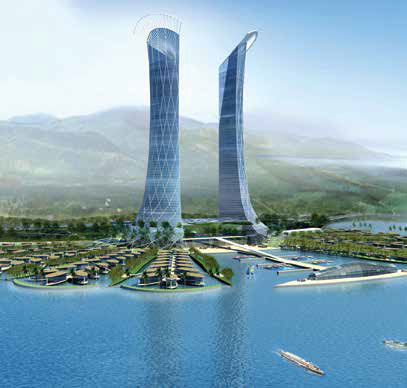
It’s not just Quang Ninh that’s hot for this. Marina City is reported to have the endorsement of the Communist Party’s all-powerful Politburo, and the buzz surrounding it was enough last year to move some members of the National Assembly to raise the possibility of allowing the country’s population of 90 million to gamble in casinos, something that has been off limits to them by law since the industry was granted official recognition in the early ’90s. The ban has been a major obstacle to Vietnam’s ability to attract the large-scale foreign investment in tourism the government says it wants. Proposals have centered on softening the ban on some sort of trial basis at Van Don, which would be the easier sell politically, and the Politburo is believed to concur, at least in principle.
Domestic Affairs
Silver Heritage, a regional casino investor and machine gaming operator based in Hong Kong, estimates Vietnam’s six foreignersonly casinos to be worth US$275 million-$300 million in gaming revenue a year. That’s only about 0.1% of the Asian market as calculated by Fitch Ratings. It is perhaps the market’s supreme irony. Phnom Penh’s NagaWorld figures 40% of its annual gaming revenue is contributed by Vietnamese streaming into Cambodia by the tens of thousands for the flutter prohibited them at home. So as ironies go you could put a price on this one—a hefty $100 million a year at least, not counting a string of gambling dens along the border where untold millions are lost—while The Grand – Ho Tram struggles mightily on a beautiful beach lapped by sky blue waters 90 kilometers from Ho Chi Minh City, the largest metropolitan area in the country.
Ho Tram’s 90 table games and 1,000 slot machines took in less than $1 million a month combined from its opening last July through the beginning of this year. In all it generated $12.5 million, which includes the 540-room hotel, the restaurants and the rest of the non-gaming offering, which is sizable. This was revealed in testimony its US-Canadian ownership recently gave to the National Assembly’s Finance and State Budget Committee. In light of it there are some key provisions in the framework for national regulation the Assembly is considering that look almost comical. The draft prepared by the Ministry of Finance requires developers to commit to no less than US$4 billion to be considered for a casino, $2 billion of it up front. That’s a lot of money given that the new rules contemplate no statutory limit on the number of licenses. Investors also will need to show at least 10 years of casino management experience, which in theory invalidates both The Grand and the Lims up at Lao Cai. No operator in the current market would qualify. The one plus is that existing caps on slots and tables (2,000 and 180, respectively) would be removed, and an earlier proposal for limiting gaming to 3% of total floor space has been scrapped.
At any rate, Lim Kok Thay and Genting walked away for far less. They’d planned a massive resort for a special economic zone in the province of Quang Nam near the popular resort city of Da Nang on the central coast. Da Nang has been good to its small casino at the Silver Shores International Resort. The city’s airport, the country’s third-largest, is only an hour and a half from southern China. Officials say foreign visitation rose by more than 17% last year, and Hanoi has agreed to a recommendation from the local goverment for a larger casino at Silver Shores.
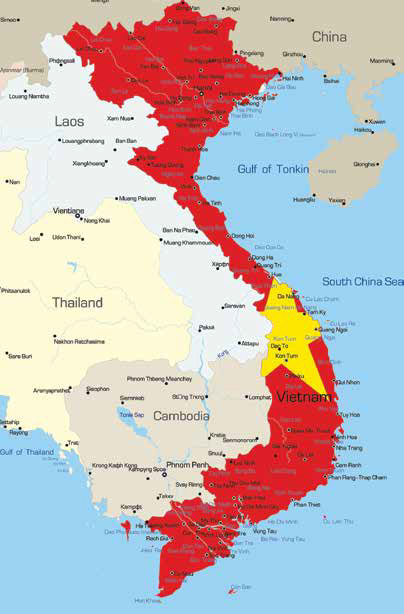
Whether this would have been enough to support what Genting had in mind is an open question, and probably one without a desirable answer, if Ho Tram is any indication. Certainly, Genting thought better of it, and in 2012 they abandoned their venture, known as South Hoi An, which, not surprisingly, has languished ever since, together with its $4 billion budget. The surviving partner, VinaCapital, a Vietnam-facing fund manager and property developer, has hung on, though, and recently announced that it has secured backing to begin moving forward on it in phases with initial plans calling for a 500-room luxury hotel and 90 table games. The new investor is a Los Angeles-based group known as Peninsula Pacific whose chairman had founded a regional casino operator in the US that was sold to Las Vegas-based Boyd Gaming a couple of years ago for $1.4 billion.
Another US group, Rose Rock, it’s called, has unveiled plans for a $2.5 billion resort on the south-central coast with a 700-room luxury hotel, high-end residences and 350 marina berths. The Rockefeller family is backing it. The group has not said whether it will seek a gaming license.
Then there is a Vietnamese company, this one right in Ho Tram’s neck of the woods, that is partnering with a Hong Kong-based contractor on three large-scale resorts— one of them an international eco-tourist destination planned for 1,500 hectares in the province of Ba Ria-Vung Tau, where The Grand is located. Ho Tram Tourism Company, as it’s called, is joining with Hong Kong’s Dragon Best International on the projects, which will be pursued as public-private partnerships. The others are a trade center with hotels, residences and a convention center in Ho Chi Minh and a mixed-use resort complex in an economic development zone known as Bo Y on the Vietnam-Lao-Cambodia border.
The more pressing questions for The Grand are those awaiting the unfolding of the regulatory process. All eyes are fixed on it, The Grand’s especially, though not exclusively. Sheldon Adelson, for one, has spoken of Las Vegas Sands’ desire to develop something big either in Ho Chi Minh or Hanoi if a domestic market were possible, and he visited the country as recently as November to assess the prospects. It’s not irrelevant to recall also that The Grand’s original operator was to have been MGM Resorts International, and a major investor is another well-known name in US regional casinos, Pinnacle Entertainment (NYSE: PNK), which bought in for more than $100 million. Pinnacle was supposed to operate a casino and hotel planned for the resort’s second phase. It’s not known where that stands, though, since Pinnacle has written off its entire stake as a loss.
So something needs to break with the locals ban. Van Don is too far down the road for The Grand’s purposes, based on the scale of development they’re talking about there. As for The Grand recouping its investment in the existing market, that’s not an option either. At current performance levels it would take about 40 years.
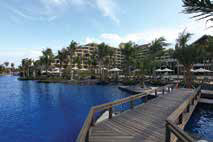
Common sense says relief will come long before that. Indeed, the understanding among some members of the National Assembly was that the draft regulations would recognize this, which they do not. Rather they affirm current policy restricting the market to foreigners and Vietnamese holding foreign passports.
At an initial meeting of members of the Standing Committee of the National Assembly to whom the draft regulations were introduced, Nguyen Van Hien, chairman of the assembly’s Legal Committee, criticized the document for “delaying the issue”.
Assembly Vice Chairman Uong Chu Luu said, “A lot of Vietnamese have traveled abroad to gamble. Why don’t we permit eligible Vietnamese to do that in the country?”
A deputy speaker, Tong Thi Phong, seconded that, saying the draft should be amended and “criteria should be established” to allow for “effective management” of a domestic market.
On the other side was Vice Speaker Huynh Ngoc Son, who spoke out against this and was cited in popular daily Thanh Nien News as saying it would pit the industry in opposition to “Vietnamese traditions and culture”.
Which appears to be the prevailing view of the government, certainly of the Ministry of Finance, which authored the draft, and what this fairly lively discussion elicited from Nhan Dan, the official news organ of the Communist Party, were all of two stolid sentences: “Delegates agreed that developing the casino business in Vietnam has both positive and negative impacts on socio-economic development. The business is expected to attract more investors to Vietnam, though the sensitive sector also requires close management.”






